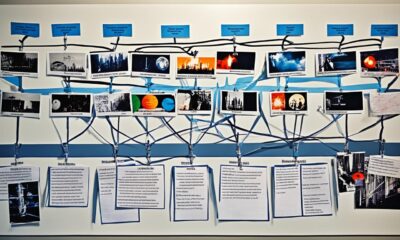Narcissistic Parents
Self-Care Strategies for Survivors of Narcissistic Parents

Have you ever wondered why certain relationships in your life are so fraught with conflict, leaving you feeling drained emotionally and questioning your self-worth? If you find yourself nodding in agreement, it may be that you’ve experienced narcissistic parenting. I, too, have traveled this path, bearing the marks of our childhood experiences which reverberate into our adulthood, influencing how we relate to people and our overall well-being.
Healing from the grip of narcissistic parents is a journey that requires compassion, self-care, and a commitment to nurturing our own emotional health. It’s about breaking free from the patterns that left us feeling invalidated and torn between our own needs and the demands of our parents. But take heart, because here’s the truth: healing is possible, and it starts with you.
In this article, we will explore self-care strategies specifically designed for adult survivors of narcissistic parents. These strategies have been tried and tested, empowering individuals like you to reclaim their lives, find healing, and build healthy relationships. It’s time to prioritize your well-being and take the necessary steps towards a brighter future.
Key Takeaways:
- Healing from narcissistic parenting is possible through self-care strategies.
- Breaking free from the patterns of narcissistic parents is essential for emotional well-being.
- Self-compassion and nurturing our own needs are crucial in the healing process.
- Understanding the impact of narcissistic parenting helps in setting boundaries.
- Seeking professional support is valuable in navigating the complexities of healing.
Understanding Narcissism and Its Effects on Children
Narcissistic parents often lack empathy, need admiration, and exhibit grandiose behaviors. They may overlook the needs of their children and prioritize their own validation. The narcissistic traits a parent exhibits may stem from adverse events in their own childhood, such as neglect, abuse, or household dysfunction.
Understanding narcissism and its effects can help adult survivors identify toxic behaviors, set boundaries, and recognize the characteristics of healthy relationships.
Children of narcissistic parents often experience emotional and psychological abuse, leading to a range of long-term difficulties such as low self-esteem, anxiety, and depression.
| Effects of Narcissistic Parenting | Coping Mechanisms for Adult Survivors |
|---|---|
|
|
Recognizing the impact of narcissistic parenting is the first step towards healing from narcissistic parent abuse. By understanding the dynamics of narcissism, individuals can gain clarity on their own experiences and work towards breaking free from the cycle of abuse.
Coming to terms with the effects of narcissistic parents can be challenging, but it is a necessary part of the healing process. Adult survivors can develop coping mechanisms, such as setting healthy boundaries and seeking therapy, to regain control of their lives and prioritize their own well-being.
The Importance of Forgiveness in Healing
Forgiveness plays a crucial role in the healing journey of adult survivors of narcissistic parents. It’s not about defending the behavior of a narcissistic parent, but rather about letting go of anger and resentment for our own emotional and physical well-being. Research has shown that forgiveness can have a positive impact on various aspects of our health, including sleep quality, heart health, cholesterol levels, and blood pressure.
Forgiving our narcissistic parents does not mean forgetting or reconciling with them. It’s about finding inner peace and moving forward in our own healing journey. By releasing the burden of resentment, we free ourselves from the emotional weight that holds us back.
“Forgiveness is not a contract. It doesn’t mean we have to reconcile or continue to allow abusive behavior in our lives.”
Instead, forgiveness allows us to reclaim our power and focus on our own emotional healing. It is a process that brings us closer to emotional freedom and empowers us to create the life we deserve.
Benefits of Forgiveness
Forgiving our narcissistic parents is a transformative act of self-care. It can have profound effects on our mental and physical well-being. By embracing forgiveness, we can experience:
- Improved sleep quality for a more restorative rest.
- Enhanced heart health for a stronger and healthier cardiovascular system.
- Lowered cholesterol levels for better overall health.
- Reduced blood pressure, promoting cardiovascular well-being.
Cultivating Forgiveness
Forgiveness is a personal journey, and each person’s process may be unique. Here are some strategies to cultivate forgiveness:
- Understanding the impact: Acknowledge the effects of narcissistic parenting on your life and recognize the need for healing.
- Expressing emotions: Allow yourself to feel and express the anger, sadness, and pain associated with your experiences.
- Practicing self-compassion: Treat yourself with kindness and understanding, emphasizing that forgiveness is for your benefit, not for the narcissistic parent.
- Seeking support: Connect with supportive friends, family, or therapists who can provide guidance and understanding throughout your forgiveness journey.
- Release rituals: Engage in symbolic practices, such as writing a forgiveness letter or engaging in a release ceremony, to let go of the emotional baggage associated with your narcissistic parent.

| Forgiveness Benefits | Description |
|---|---|
| Sleep Quality | Improves sleep patterns for enhanced rest and rejuvenation. |
| Heart Health | Enhances cardiovascular well-being for a healthier heart. |
| Cholesterol Levels | Reduces cholesterol levels for improved overall health. |
| Blood Pressure | Lowers blood pressure, promoting cardiovascular well-being. |
Recognizing and Addressing Intergenerational Trauma
Healing from narcissistic parent abuse requires a deep understanding of intergenerational trauma and its role in perpetuating toxic behaviors. Adult survivors of narcissistic parents often find themselves trapped in a cycle of trauma, where the very traits exhibited by their parents are a reflection of adverse events in their own childhood.
Breaking free from this cycle of intergenerational trauma is crucial for personal healing and self-empowerment. It starts with acknowledging and validating the losses that were incurred during childhood and recognizing that the narcissistic behaviors were not a reflection of our worth as individuals.
Educating ourselves about narcissism and its effects is an important step in the healing process. By gaining knowledge and understanding, we can begin to unpack the complexity of our upbringing, identify the patterns of narcissistic behavior, and develop strategies to overcome the lasting impact.
Intergenerational trauma is not our fault, but healing is our responsibility.
Through therapy, self-reflection, and support groups, we can start to heal the wounds inflicted by our narcissistic parents. It is a journey of self-discovery and self-empowerment, as we learn to separate our identity from the toxic influence of our upbringing and forge our own path towards fulfillment and well-being.
Recognizing and addressing intergenerational trauma is an essential part of the healing process. By doing so, we can break free from the chains of the past and cultivate a future that is rooted in self-love, resilience, and authentic relationships.
| Benefits of Recognizing and Addressing Intergenerational Trauma |
|---|
| 1. Liberation from the cycle of toxic behaviors. |
| 2. Increased self-awareness and understanding. |
| 3. Enhanced ability to form healthy, fulfilling relationships. |
| 4. Improved mental and emotional well-being. |
| 5. Empowerment to break free from the influence of narcissistic parents. |
- Embracing self-compassion and self-care.
- Building a strong support network.
- Continuing the journey of self-discovery and personal growth.
Setting Boundaries for Self-Protection
When healing from the abuse of narcissistic parents, setting boundaries is an essential practice for self-protection. It allows us to establish limits and protect our emotional well-being from the damaging influence of narcissistic behaviors.
Internal boundaries involve recognizing that unkind behaviors displayed by narcissistic parents are symptoms of their narcissism, rather than reflections of our worth. By internalizing this understanding, we can detach ourselves emotionally from their hurtful actions and maintain a stronger sense of self.
External boundaries focus on reducing over-accommodation of our narcissistic parent’s needs and expressing our own preferences and opinions. By asserting ourselves and setting clear boundaries with our parent, we establish a healthier dynamic that respects our individuality.
While establishing boundaries may be easier when we are living independently from our parent, it is still possible to set boundaries even when we are in contact with them. It requires careful navigation, patience, and self-empowerment to maintain these boundaries, but doing so can help us protect our mental and emotional well-being.
Remember, self-care practices for healing from narcissistic parent abuse involve not only self-reflection and internal growth but also actively implementing boundaries to shield ourselves from further harm.

Quotes:
“Boundaries are not walls; they are bridges that allow healthy connections to flourish while protecting us from harm.” – Unknown
“Setting boundaries is not a sign of selfishness, but rather an indication of self-respect and self-care.” – Unknown
| Benefits of Setting Boundaries |
|---|
| Preserves our emotional well-being |
| Helps establish a healthier parent-child dynamic |
| Affirms our individuality and self-worth |
| Allows us to prioritize our own needs and aspirations |
| Reduces the impact of narcissistic manipulation |
Establishing Your Own Identity and Path
Breaking free from the damaging effects of narcissistic parents is a journey of self-empowerment and personal growth. One crucial step in this process is establishing your own identity and forging your own path. This requires making choices that may not align with your parent’s expectations but are essential for your own well-being and happiness.
When you have been raised by narcissistic parents, you may have been constantly influenced and manipulated to fulfill their desires and meet their expectations. However, it is important to recognize that you have the power to break free from this cycle and live life on your own terms.
In order to establish your own identity and path, you need to prioritize your own interests, goals, and values. This means taking the time to reflect on what truly matters to you and what brings you joy and fulfillment. It may involve exploring new hobbies, pursuing a different career path, or surrounding yourself with people who support and encourage your personal growth.
Embracing Your Authentic Self
Embracing your authentic self is a powerful way to establish your own identity and path. This means embracing your strengths, passions, and values, even if they differ from what your narcissistic parents may have expected or desired for you.
Embrace who you truly are and be proud of it. You are a unique individual with your own dreams and aspirations. Don’t let the expectations of others hold you back from living a fulfilling life.
By embracing your authentic self, you will be able to make decisions that align with your true desires and values, rather than trying to live up to the expectations imposed by your narcissistic parents.
Setting Boundaries
Establishing your own identity and path also involves setting boundaries with your narcissistic parents. Boundaries are essential for protecting your emotional well-being and preventing further manipulation or abuse.
Setting boundaries can include limiting contact with your parents, establishing clear expectations and consequences for their behavior, and asserting your own needs and preferences. By setting boundaries, you are affirming your right to be treated with respect and creating space for your own personal growth and empowerment.
Remember, establishing your own identity and path is a process that takes time and self-reflection. It requires the courage to step outside the expectations and limitations imposed by narcissistic parents and embrace your own unique journey of self-discovery and self-empowerment.
Identifying Healthy Relationship Characteristics
Growing up with a narcissistic parent can make it challenging to recognize what a healthy relationship looks like. However, learning about narcissism and understanding its effects can help adult survivors develop the necessary skills to identify beneficial human interactions. By using their experiences and insights, they can break free from the cycle of mental health issues caused by narcissistic parents and cultivate healthy friendships and romantic relationships.
When it comes to identifying healthy relationship characteristics, there are several key aspects to consider:
- Respect and Equality: Healthy relationships are built on respect for each other’s boundaries, opinions, and autonomy. Both partners should feel equal and valued in the relationship.
- Communication: Open and honest communication is essential for maintaining a healthy relationship. Healthy partners actively listen and express their thoughts and feelings without judgment or manipulation.
- Empathy and Support: Healthy relationships involve empathy and mutual support. Partners should be able to understand and validate each other’s emotions, providing comfort and encouragement when needed.
- Mutual Trust: Trust forms the foundation of healthy relationships. Each partner should trust the other’s intentions, actions, and commitments. Building and maintaining trust requires consistency, reliability, and honesty.
- Boundaries: Respect for personal boundaries is crucial in any healthy relationship. Partners should establish and respect each other’s boundaries, ensuring that individual autonomy and well-being are honored.
Remember, identifying healthy relationship characteristics takes time and practice. It can also be helpful to seek guidance from mental health professionals, therapists, or support groups specializing in coping mechanisms for adult survivors of narcissistic parents. In these spaces, you can find valuable self-care resources and connect with others who have gone through similar experiences.
Concluding Thoughts
Recognizing and cultivating healthy relationships is an important aspect of healing from the impact of narcissistic parents. By learning about healthy relationship characteristics, setting and respecting boundaries, and seeking support, adult survivors can break free from the negative patterns and find fulfillment in their interpersonal connections. Remember, you deserve to be in relationships that nurture and uplift you.

Seeking Professional Support
Finding a therapist who specializes in narcissistic relationship patterns can provide valuable support for survivors of narcissistic parents. A trained therapist can help us identify narcissistic behaviors, change thought patterns, set boundaries, and identify healthy relationship characteristics. Professional support is essential in navigating the complex emotions and challenges that come with healing from narcissistic parent abuse.

Healing from narcissistic parent abuse can be a difficult and confusing process. It is not something we can or should go through alone. That’s why seeking professional support is crucial. A therapist who specializes in working with adult children of narcissistic parents can provide the guidance, validation, and tools we need to heal and move forward.
During therapy sessions, we can explore the impact of our upbringing and the specific ways in which narcissistic abuse has affected us. By gaining a deeper understanding of these dynamics, we can begin to heal emotional wounds and develop healthier coping strategies.
A therapist can help us identify narcissistic behaviors, both in ourselves and in others. Through guided reflection and discussion, we can learn to recognize harmful patterns of thinking and behavior that may have been ingrained by our narcissistic parent. This awareness is crucial in breaking free from the cycle of abuse and creating healthier, more fulfilling relationships.
Furthermore, therapy provides a safe space for us to set boundaries and practice assertiveness. A therapist can help us develop effective strategies for setting and maintaining boundaries with our narcissistic parent, as well as with others in our lives. Learning to assert ourselves and protect our well-being is an essential part of the healing process.
Lastly, seeking professional support can help us identify the characteristics of healthy relationships. As survivors of narcissistic parent abuse, we may have difficulty discerning healthy relationship dynamics from dysfunctional ones. A therapist can guide us in recognizing and cultivating relationships that are based on mutual respect, empathy, and healthy communication.
Remember, healing from narcissistic parent abuse takes time and effort. It is a journey of self-discovery, self-compassion, and growth. With the support of a trained therapist, we can navigate the complexities of healing and emerge stronger, more empowered, and ready to embrace a life free from the lingering effects of narcissistic abuse.
The Journey to Healing is Possible
It is important to recognize that healing from narcissistic parent abuse is possible. While the journey may be arduous and complex, with a focus on self-care, support, and self-compassion, survivors can overcome the impact of narcissistic parents. Reclaiming one’s identity, setting boundaries, and seeking professional help are important steps toward healing and creating a fulfilling and empowered life.
“Healing from narcissistic parent abuse is a brave and courageous journey. It is not an easy path, but it is one that leads to freedom, self-discovery, and inner peace.”
When healing from narcissistic parent abuse, self-care practices play a crucial role. Taking time for oneself, engaging in activities that bring joy and relaxation, and prioritizing mental and emotional well-being are essential. Whether it’s through meditation, journaling, art therapy, or engaging in hobbies, self-care practices can provide a sense of stability and self-nurturing.
Seeking support from trusted friends, family members, or support groups can also be invaluable in the healing process. These individuals can offer validation, understanding, and empathy, creating a sense of belonging and helping survivors feel less alone in their journey. Additionally, professional help from therapists or counselors who specialize in healing from narcissistic abuse can provide guidance and tools for overcoming the trauma.
Reclaiming Identity and Setting Boundaries
One of the critical steps in healing is reclaiming one’s identity. Narcissistic parents often manipulate and control their children, making it difficult for them to develop a strong sense of self. It is vital for survivors to rediscover who they are, their values, and their aspirations. This may involve exploring new interests, setting personal goals, and challenging the negative beliefs instilled by their narcissistic parent.
Setting boundaries is also essential for self-protection and healing. Learning to say no, assert one’s needs, and establish healthy limits can help survivors regain a sense of control over their lives. By setting boundaries, individuals can create safe spaces and minimize exposure to toxic behaviors and manipulation from the narcissistic parent.
Self-Compassion and Gratitude
Throughout the healing journey, self-compassion plays a crucial role. It is essential for survivors to treat themselves with kindness, understanding, and forgiveness. Recognizing that they were victims of abuse and that the blame lies with the narcissistic parent can free survivors from self-blame and guilt.
Practicing gratitude is another powerful tool for healing. Focusing on the positive aspects of life and expressing gratitude for the small moments of joy and progress can shift the mindset from pain and resentment to growth and healing. Developing a gratitude practice, such as journaling or daily affirmations, can foster resilience and optimism.

The journey to healing from narcissistic parent abuse is unique for each individual. It requires patience, determination, and self-care practices tailored to one’s specific needs. By acknowledging the impact of narcissistic parents, seeking support, and embracing self-compassion, survivors can break free from the cycle of abuse and create a life filled with healing, self-empowerment, and healthy relationships.
Conclusion
Healing from narcissistic parent abuse is a challenging but necessary journey for adult survivors. It requires implementing self-care strategies, seeking support, setting boundaries, and understanding the effects of narcissism.
By prioritizing self-care, survivors can nurture their emotional and mental well-being. This may include engaging in activities that promote relaxation and self-reflection, such as mindfulness exercises, journaling, or seeking professional therapy.
Setting boundaries is essential for protecting oneself from further harm. Learning to recognize toxic behaviors and asserting one’s needs and limits can create a safe space for personal growth and healing.
It is important to remember that healing takes time. With perseverance and self-compassion, adult survivors can break free from the cycle of narcissistic abuse and create a life of healing, self-empowerment, and healthy relationships.
Self-care strategies for adult survivors of narcissistic parents include practicing forgiveness, recognizing intergenerational trauma, setting boundaries, establishing one’s own identity and goals, seeking professional support, and learning about healthy relationship characteristics.
Understanding narcissism and its effects can help adult survivors identify toxic behaviors, set boundaries, and recognize the characteristics of healthy relationships. It aids in breaking the cycle of intergenerational trauma and promotes emotional healing.
Forgiveness is not about defending the behavior of a narcissistic parent but rather about letting go of anger and resentment for the sake of one’s own emotional and physical health. It leads to improvements in sleep quality, heart health, cholesterol levels, and blood pressure.
Adult survivors of narcissistic parents may be part of a cycle of intergenerational trauma. Acknowledging the losses and nurturing one deserved as a child, and understanding that the narcissistic behaviors were not a reflection of one’s worth, aids in breaking this cycle and promoting healing. Setting boundaries is crucial for protecting oneself from the influence of a narcissistic parent. Internal boundaries involve recognizing unkind behaviors as symptoms of narcissism rather than reflections of one’s worth. External boundaries involve expressing one’s preferences and opinions and tapering back on over-accommodating the parent’s needs.
Breaking free from the damaging effects of a narcissistic parent involves establishing one’s own identity and pursuing personal goals. Changing one’s path and prioritizing one’s interests and goals can create distance from the manipulation tactics of the parent and aid in the healing process.
Learning about narcissism and its effects can help adult survivors develop the skills to identify beneficial human interactions. Using their experiences and insights, they can find healthy friendships and romantic relationships, breaking the cycle of mental health issues caused by narcissistic parents.
Finding a therapist who specializes in narcissistic relationship patterns can provide valuable support for survivors. A trained therapist can help identify narcissistic behaviors, change thought patterns, set boundaries, and identify healthy relationship characteristics, ultimately aiding in the healing process.
Yes, healing from narcissistic parent abuse is possible. With a focus on self-care, support, and self-compassion, adult survivors can overcome the impact of narcissistic parents, reclaim their identity, and create a fulfilling and empowered life. Self-care strategies such as forgiveness, setting boundaries, and seeking professional help are essential for healing from narcissistic parent abuse. They promote emotional and mental well-being and empower survivors to break free from the cycle of narcissistic abuse.
FAQ
What self-care strategies can help adult survivors of narcissistic parents?
How does understanding narcissism help in healing from narcissistic parent abuse?
What is the importance of forgiveness in healing from narcissistic parent abuse?
How does recognizing and addressing intergenerational trauma help in healing?
Why is setting boundaries important for adult survivors of narcissistic parents?
How does establishing one’s own identity and path aid in healing from narcissistic parent abuse?
How can adult survivors of narcissistic parents identify healthy relationship characteristics?
Why is seeking professional support important for healing from narcissistic parent abuse?
Is healing from narcissistic parent abuse possible?
What is the importance of self-care strategies for adult survivors of narcissistic parents?
Narcissistic Parents
Narcissistic Parents: Signs & Coping Strategies

Have you ever felt as though you were invisible in your own family? Like your feelings and needs were constantly overshadowed by someone else’s larger-than-life ego? If this sounds familiar, you’re not alone. Many of us grew up with narcissistic parents, whose self-centeredness and lack of concern for our well-being have profoundly impacted our lives.
Living under the influence of narcissistic parents can leave us feeling invalidated and emotionally drained. Their constant need for attention, their dismissive attitude toward our struggles, and their inability to take responsibility for their actions can leave lasting scars on our self-esteem and mental health.
I remember constantly yearning for my parents’ approval, craving their attention and love that never seemed to be fully reciprocated. It took me years to realize that their behavior was not a reflection of my worthiness or value as a person, but rather a manifestation of their own issues.
But despite the pain and challenges, I also want you to know that healing and growth are possible. By arming ourselves with knowledge and implementing effective coping strategies, we can break free from the cycle of narcissistic parenting and create a healthier, more fulfilling life for ourselves.
In this article, we will explore the signs of narcissistic parents, understand the impact they have on our lives, and discover coping strategies to navigate the complexities of this relationship. Together, let’s take the first step towards reclaiming our power and finding healing.
Key Takeaways:
- Living with narcissistic parents can leave us feeling invalidated and emotionally drained.
- Their self-centeredness and dismissive attitude can deeply impact our self-esteem and mental well-being.
- Understanding the signs of narcissistic parents is the first step towards healing and moving forward.
- Coping strategies such as setting boundaries, limiting contact, and reframing the relationship can help us reclaim our power.
- Seeking professional help and building a support network are crucial in our journey towards healing.
Understanding Narcissistic Personality Disorder (NPD)
In our journey of understanding narcissistic parents, it is essential to delve into the world of narcissistic personality disorder (NPD). NPD is a mental health condition characterized by a profound sense of self-importance, a lack of empathy, and an insatiable need for admiration. By recognizing the signs and symptoms of NPD, we can better comprehend and navigate the complexities of interacting with narcissistic parents.
While diagnosing NPD requires the expertise of a mental health professional, it is important to familiarize ourselves with the common signs that may point to this disorder. Some key indicators of NPD include:
- Self-centeredness: A narcissistic parent often puts their own needs and desires above all else, lacking genuine concern for others.
- Low tolerance for your needs: Your needs, emotions, and aspirations are frequently dismissed or invalidated by a narcissistic parent.
- Inability to take responsibility: Narcissistic parents often struggle to acknowledge their mistakes or accept accountability for their actions, instead deflecting blame onto others.
Recognizing these signs allows us to gain greater insight into the behavior and motivations of narcissistic parents. It equips us with the knowledge to develop effective strategies for managing interactions and mitigating the impact of their actions on our well-being.
The Diagnostic Criteria for NPD
While we can identify common signs of NPD, it is crucial to understand the diagnostic criteria used by mental health professionals. The Diagnostic and Statistical Manual of Mental Disorders (DSM-5) outlines the following criteria:
| Diagnostic Criteria for NPD |
|---|
| Exaggerated sense of self-importance |
| Preoccupation with fantasies of unlimited success, power, brilliance, or beauty |
| Belief in being special and unique |
| Requires excessive admiration |
| Sense of entitlement |
| Exploitative behavior towards others |
| Lack of empathy |
| Envious of others or believes others are envious of them |
| Arrogant and haughty behavior |
These criteria provide valuable insights into the internal workings and psychology of individuals with NPD. While recognizing the signs is crucial, it is important to approach the topic with sensitivity and seek professional guidance for an accurate diagnosis.
The Impact of Narcissistic Parents on Children
Children raised by narcissistic parents often face a myriad of challenges that can have long-term consequences on their well-being. The effects of narcissistic parenting are far-reaching, impacting various aspects of a child’s life.
Issues Faced by Children of Narcissistic Parents
One of the primary issues faced by children of narcissistic parents is a significant impact on their self-esteem. Constant criticism, belittling, and invalidation from narcissistic parents can lead to feelings of inadequacy and self-doubt. These children often struggle to recognize their own worth and value.
Growing up, my narcissistic mother always made me feel like I wasn’t good enough. She would constantly compare me to others and dismiss my achievements. It took me years to realize my true worth and build a healthy sense of self-esteem.” – Anonymous
Children of narcissistic parents also tend to develop people-pleasing tendencies. They learn early on that meeting their parents’ unrealistic expectations is a means to gain approval and avoid criticism. This constant need for validation can lead to an unhealthy pattern of seeking external validation in their relationships.
Note: The image below captures the emotional toll of growing up with narcissistic parents.

Long-Term Consequences of Narcissistic Parenting
The impact of narcissistic parenting can extend well into adulthood, affecting the child’s mental health and overall well-being. Children raised by narcissistic parents may experience increased levels of anxiety, depression, and a negative self-image.
“My narcissistic father always made me feel like I didn’t matter. As an adult, I struggle with anxiety and depression, constantly battling negative thoughts about myself. It’s difficult to shake off the effects of a childhood filled with emotional manipulation and narcissistic behavior.” – Anonymous
The struggles faced by children of narcissistic parents can also manifest in their ability to form healthy relationships. Growing up with a parent who prioritizes their own needs often leaves these individuals uncertain about how to set boundaries and recognize healthy relationship dynamics. Codependency and difficulties in establishing boundaries are common challenges.
Comparison of Effects on Children of Narcissistic Parents
| Effects | Description |
|---|---|
| Poor Self-Esteem | Feelings of inadequacy, self-doubt, and low self-worth |
| People-Pleasing Tendencies | Constant need for validation and difficulty asserting personal needs |
| Codependency | Struggle to set boundaries and form healthy relationships |
| Anxiety and Depression | Increased levels of anxiety, sadness, and negative self-image |
It is essential for individuals who have experienced the effects of narcissistic parenting to recognize that these challenges can be overcome with support and healing.
Types of Coping Mechanisms for Children of Narcissistic Parents
Children raised by narcissistic parents often develop coping mechanisms as a way to navigate their challenging upbringing. These coping mechanisms, while understandable given the circumstances, can have long-term effects on their mental and emotional well-being.
One common coping mechanism is the fawning response. This involves appeasing the narcissistic parent in order to avoid becoming a target of their criticism or anger. Children may go to great lengths to please their parent, constantly seeking their approval and validation. However, this fawning response can lead to a lack of boundaries and a tendency to prioritize others’ needs over their own.
“Children raised by narcissistic parents may also resort to mimicking narcissistic behavior as a way to assert their own importance. They may observe their parent’s self-centeredness and adopt similar behaviors in an attempt to gain control or protect themselves.”
Mimicking narcissistic behavior can serve as a defense mechanism for children, allowing them to feel a sense of power or control in a chaotic environment. However, this coping mechanism can perpetuate a cycle of unhealthy behaviors and hinder the development of healthy relationships.
It is important for children of narcissistic parents to recognize these coping mechanisms and understand their impact. By gaining insight into these patterns, individuals can begin to break free from codependency, establish healthier boundaries, and create a more balanced sense of self-worth.
Next, we will explore the toll that narcissistic parents can have on their children’s self-esteem and mental health.
The Toll on Self-Esteem and Mental Health
Narcissistic parents can have a significant impact on their child’s self-esteem, leading to a range of self-esteem issues and mental health effects. Growing up under the influence of narcissistic parents can result in feelings of inadequacy, imposter syndrome, and negative thoughts about oneself. The constant need for validation and the manipulative tactics employed by narcissistic parents can have long-lasting effects on their child’s mental well-being.
Children of narcissistic parents often struggle with anxiety, sadness, and even depression as a result of the toxic environment in which they were raised. The emotional roller coaster of dealing with narcissistic parents can take a toll on their mental health, leaving them feeling overwhelmed and emotionally drained. It’s important to recognize the signs and seek support to navigate these challenges and find healing.
When children are subjected to constant criticism and emotional manipulation, it can erode their self-esteem and leave them with deep-seated insecurities. The relentless focus on the needs of the narcissistic parent leaves little room for the child’s own emotional well-being, resulting in a skewed sense of self and a lack of confidence.
“Being constantly belittled and criticized by my narcissistic mother made me doubt myself at every turn. I became overly self-critical and constantly sought external validation, which only worsened my anxiety and self-esteem issues.”
The negative impact of narcissistic parenting can extend well into adulthood, affecting the individual’s ability to form healthy relationships and maintain positive mental health. The scars left by narcissistic parents can manifest as ongoing anxiety, chronic feelings of sadness, and a distorted self-image.

| Effects of Narcissistic Parents | Examples | |
|---|---|---|
| 1 | Poor self-esteem | Constant self-doubt, feelings of inadequacy |
| 2 | Anxiety | Excessive worrying, fear of judgment |
| 3 | Sadness and depression | Long periods of low mood, loss of interest in activities |
Strategies for Dealing with Narcissistic Parents
Dealing with a narcissistic parent can be a challenging and emotionally draining experience. However, there are effective strategies that can help you navigate this difficult relationship and prioritize your own well-being. Here are some key strategies to consider:
Setting Boundaries
Setting firm boundaries is crucial when dealing with a narcissistic parent. Clearly communicate your limits and expectations, making it clear what behavior is acceptable and what is not. Be assertive in expressing your needs and boundaries, and remember that it’s okay to prioritize your own well-being.
Limited Contact
In some cases, limited contact with a narcissistic parent may be necessary to protect your mental health. Evaluate your own well-being and consider reducing the amount of time spent with your parent. This may include minimizing phone calls, visits, or interactions that could potentially trigger emotional distress.
Reframing the Relationship
Reframing the relationship with a narcissistic parent involves shifting your perspective and focusing on positive aspects rather than dwelling on negative experiences. This can involve creating distance emotionally and mentally, and finding ways to detach yourself from their manipulative behavior. Remember that your parent’s behavior is not a reflection of your worth.
Self-Care and Support
Given the challenging nature of dealing with a narcissistic parent, it’s crucial to prioritize self-care. Take time for activities that bring you joy and help you relax. Seek support from trusted friends, loved ones, or a mental health professional who can provide guidance and help you navigate the complexities of this relationship.
| Strategy | Description |
|---|---|
| Setting Boundaries | Clearly communicate your limits and expectations, and assertively express your needs and boundaries. |
| Limited Contact | Consider reducing the amount of contact with your parent to protect your mental health. |
| Reframing the Relationship | Shift your perspective and focus on positive aspects rather than dwelling on negative experiences. |
| Self-Care and Support | Prioritize self-care, engage in activities that bring you joy and seek support from trusted individuals or professionals. |

By implementing these strategies, you can gain control over your interactions with a narcissistic parent and protect your own well-being. Remember, you have the right to create a safe and healthy environment for yourself, and seeking support is an essential part of the healing process.
Understanding Narcissistic Parents: Traits and Behaviors
Narcissistic parents often exhibit a range of traits and behaviors that can have a profound impact on their children’s well-being. By understanding these characteristics, we can better navigate our interactions and cope with the challenges that arise.
Traits of Narcissistic Parents
One of the key traits of narcissistic parents is their self-centeredness. They prioritize their own needs and desires above everything else, including the well-being of their children. This self-centeredness often manifests as a constant need for attention and validation. They can become highly demanding, making it challenging for their children to receive the love, care, and support they require.
Narcissistic parents also display controlling behavior. They seek to dominate and manipulate their children, often attempting to shape them into a reflection of their own desires and expectations. Their need for control can stifle the independence and personal growth of their children, leaving them feeling trapped and without agency in their own lives.
Emotional Manipulation
Emotional manipulation is another common behavior exhibited by narcissistic parents. They often lack empathy for their children’s feelings and minimize their struggles. Instead of providing support and understanding, they may dismiss their child’s emotions or even blame them for their own unhappiness. This emotional manipulation can cause lasting damage to a child’s self-esteem and mental well-being.
It is important to recognize that these behaviors are not healthy or normal parenting practices. Understanding the traits of narcissistic parents empowers us to set boundaries and protect ourselves from emotional harm.
“Narcissistic parents prioritize their own needs and desires over their children’s well-being. Understanding these traits and behaviors can help in managing and navigating interactions with narcissistic parents.”

Traits and Behaviors of Narcissistic Parents
| Trait | Description |
|---|---|
| Self-centeredness | Prioritizing their own needs and desires above their children’s well-being |
| Controlling behavior | Seeking to dominate and shape their children’s lives |
| Emotional manipulation | Minimizing their child’s emotions and using guilt or blame to maintain control |
| Lack of empathy | Failing to understand or empathize with their children’s feelings |
| Constant need for attention | Requiring constant validation and making their children feel invisible |
Creating Boundaries with Narcissistic Parents
When dealing with narcissistic parents, it is crucial to establish clear boundaries. Communicating and enforcing these boundaries helps protect your mental health and well-being, and paves the way for healthier interactions with your parents.
Assertiveness is key when creating boundaries with narcissistic parents. It involves expressing your needs and desires in a confident and respectful manner. By clearly communicating what is acceptable and what is not, you establish a framework that respects your autonomy and fosters healthier relationships.
Assertiveness can be challenging when dealing with narcissistic parents who may be resistant to change or dismissive of your boundaries. However, standing your ground and staying true to your needs is essential for your own well-being.
Remember, creating boundaries does not make you selfish or unloving. It is a necessary step towards self-preservation and maintaining your mental and emotional health.
Tips for creating boundaries with narcissistic parents:
- Identify and understand your limits and needs.
- Communicate your boundaries clearly and assertively.
- Be consistent in enforcing your boundaries.
- Prepare for resistance or pushback from your parents.
- Seek support from friends, family, or a therapist to gain encouragement and guidance.
Creating boundaries with narcissistic parents requires strength and resilience. Remember, your well-being comes first, and setting boundaries is an essential part of taking care of yourself.
Seeking Professional Help and Support
When coping with the effects of narcissistic parenting, seeking professional help and support can provide valuable guidance and assistance. Therapy or counseling with a qualified mental health professional can offer a safe space to explore and understand the complex dynamics of the parent-child relationship.
Therapy sessions can help individuals develop coping strategies, build resilience, and regain their sense of self-worth. A therapist can provide validation, offer insights into patterns of behavior, and help develop healthier ways of relating to narcissistic parents.
“Therapy was a game-changer for me. It allowed me to gain clarity and perspective on my experiences with a narcissistic parent. The therapist helped me identify unhealthy coping mechanisms and provided invaluable support throughout my healing journey.”
Aside from professional therapy, building a support network can be beneficial. Connecting with friends, loved ones, or joining support groups specifically tailored to individuals who have experienced narcissistic parenting can provide a sense of validation, understanding, and guidance.
Here are some ways seeking professional help and support can be beneficial:
- Access to expert guidance and strategies for coping with the effects of narcissistic parenting
- A safe and non-judgmental space to express emotions and explore past experiences
- Validation and affirmation that the experiences and challenges faced are real and valid
- Opportunity to develop healthier coping mechanisms and build resilience
Remember, everyone’s healing process is unique, and seeking professional help and support is a personal decision. It is important to find a therapist or support group that aligns with your specific needs and feels like a comfortable fit.
Support from professionals and peers can be instrumental in finding healing and moving towards personal growth and well-being.

Making the Decision: Limited or No Contact
When dealing with a narcissistic parent, some individuals may find it necessary to establish limited or no contact for the sake of their well-being. This decision should be made thoughtfully, considering the impact it may have on your mental health and overall happiness.
Choosing to cut off contact with a narcissistic parent is a personal choice that prioritizes your own self-care. It is important to remember that you have the right to protect yourself from toxic relationships and create boundaries that promote your well-being.
It can be beneficial to seek the guidance and support of a therapist or counselor when making this decision. They can provide valuable insights, help you navigate the emotional challenges, and assist in developing coping strategies to manage the aftermath.
Deciding to limit or cut off contact does not mean you are estranging yourself from your entire family. It simply means choosing to distance yourself from a toxic individual in order to protect your mental health and foster personal growth.
Remember, healing and moving forward from the effects of narcissistic parenting takes time, patience, and self-compassion. Prioritize your own well-being and seek the necessary support to guide you on your journey of recovery.
| Pros of Limited or No Contact | Cons of Limited or No Contact |
|---|---|
| Allows you to focus on your own well-being and mental health | Potential feelings of guilt or sadness |
| Reduces exposure to toxic and damaging behavior | Possibility of strained relationships with other family members |
| Opportunity to establish healthier boundaries | Loss of connection with extended family members |
| Chance to break the cycle of abuse and create a healthier future | Initial difficulties and adjustments to the change in family dynamics |
Note: Each individual’s situation is unique, and the decision to have limited or no contact with a narcissistic parent should be made based on what is best for your well-being.
Conclusion
Dealing with narcissistic parents can be incredibly challenging, but it’s important to remember that healing, moving forward, and personal growth are possible. By implementing the right strategies and seeking the appropriate support, we can navigate the impact of narcissistic parenting and create a better future for ourselves.
Setting boundaries is a crucial step in this process. By clearly defining what is acceptable and what is not, we protect our mental health and well-being. Additionally, seeking therapy or counseling allows us to gain a deeper understanding of the complex dynamics involved and provides the guidance and validation needed to heal.
It’s vital to prioritize self-care throughout this journey. Taking time for ourselves, engaging in activities that bring us joy, and building a support network of friends, loved ones, and support groups helps to reinforce our emotional well-being. Remember that personal growth and happiness should always be our top priority, and it’s okay to make decisions that prioritize our own well-being.
FAQ
What are the signs of narcissistic parents?
Narcissistic parents often exhibit behaviors such as excessive self-centeredness, dismissing your struggles, setting impossible expectations, and being unable to receive criticism.
How does narcissistic parenting impact children?
Children raised by narcissistic parents may experience poor self-esteem, people-pleasing tendencies, and difficulty forming healthy relationships. The impact can extend into adulthood, leading to anxiety, depression, and a negative self-image.
What are some coping mechanisms for children of narcissistic parents?
Coping mechanisms include fawning, which involves appeasing the parent to avoid becoming a target, and mimicking the parent’s behavior to assert their own importance. However, these coping mechanisms can contribute to codependency and difficulty in forming healthy relationships.
How does narcissistic parenting affect self-esteem and mental health?
Narcissistic parents can greatly impact their child’s self-esteem, leading to feelings of inadequacy, imposter syndrome, and negative thoughts about themselves. Children of narcissistic parents may also struggle with anxiety, sadness, and depression.
What are some strategies for dealing with narcissistic parents?
Strategies for dealing with narcissistic parents include setting boundaries, limiting contact, reframing the relationship, and communicating clear boundaries. Prioritizing self-care and seeking support from friends, loved ones, or a mental health professional are also crucial.
What traits and behaviors are commonly displayed by narcissistic parents?
Narcissistic parents often exhibit traits such as self-centeredness, controlling behavior, and emotional manipulation. They prioritize their own needs and desires over their children’s well-being.
How can I create boundaries with my narcissistic parent?
Creating boundaries involves being assertive in expressing your needs and communicating what is acceptable and what is not. Boundaries help protect your mental health and well-being and establish healthier interactions with narcissistic parents.
Where can I seek professional help and support for dealing with narcissistic parents?
Seeking therapy or counseling can provide valuable support in understanding and navigating the dynamics of the parent-child relationship. Building a support network of friends, loved ones, and support groups can also offer validation and guidance.
Should I consider limited or no contact with my narcissistic parent?
The decision to have limited or no contact with a narcissistic parent should be made with the support of a therapist or counselor, prioritizing self-care and mental health. It is a personal choice that varies depending on individual circumstances.
How can I heal and move forward from narcissistic parents?
Healing and moving forward from narcissistic parents involve setting boundaries, seeking therapy, prioritizing self-care, and focusing on personal growth and happiness. It is important to make decisions that prioritize your own well-being.
Narcissistic Parents
Spotting Signs of Narcissistic Parenting

Have you ever felt like you were just a part of your parent’s ego? Like your thoughts, emotions, and dreams were always overshadowed by their need for control and admiration? If this rings true, you may have experienced the impacts of narcissistic parenting.
Narcissistic parenting is a topic that hits close to home for many of us. The impact of growing up with a narcissistic parent can be profound, affecting our sense of self, our relationships, and our overall well-being. It’s a painful reality that can take years to heal from.
But how do we know if our parent’s behavior is truly narcissistic? What are the signs that we should be looking out for? In this article, we delve into the traits and effects of narcissistic parenting, helping you to identify the red flags and gain a deeper understanding of your own experiences.
Key Takeaways
- Spotting signs of narcissistic parenting is crucial for understanding and healing from its effects.
- Narcissistic parents may use their child as a means to validate themselves and prioritize their own needs over their child’s.
- Marginalization, grandiosity, manipulation, and possessiveness are common traits of narcissistic parenting.
- Growing up with a narcissistic parent can significantly impact our sense of self and relationships.
- Healing from narcissistic parenting involves recognizing the patterns, seeking support, and prioritizing our own well-being.
Uses/Lives Through One’s Child
Narcissistic parents often see their child as a source of validation, using their achievements to fulfill their own selfish needs. This behavior is one of the key characteristics of narcissistic parenting and can have detrimental effects on the child’s development.
Signs of narcissistic abuse:
- Diminishment of individuality: The child’s unique thoughts, emotions, and goals are not nurtured or valued. Instead, the focus is on the parent’s needs and desires.
- Disregard for the child’s aspirations: Narcissistic parents often push their child to succeed for their own personal gratification, without considering the child’s own desires and aspirations.
This pattern of using and living through the child can have lasting effects on the child’s self-esteem, identity, and overall well-being. It is important to recognize these signs and take steps to address and heal from narcissistic abuse.
“Narcissistic parents often view their child as an extension of themselves, seeking validation and fulfillment through their achievements.”
Marginalization
One of the effects of narcissistic parenting is marginalization, where the narcissistic parent feels threatened by their child’s potential, success, and independence. In order to maintain their own sense of superiority, they engage in various behaviors aimed at keeping the child in a position of inferiority.
These behaviors can include:
- Nit-picking: The narcissistic parent constantly finds fault with the child, criticizing even the smallest mistakes or imperfections.
- Unreasonable judgment: The parent sets impossibly high standards and expectations for the child, making it difficult for them to meet the parent’s approval.
- Unfavorable comparisons: The parent compares the child unfavorably to other people, highlighting their supposed shortcomings and making them feel inadequate.
- Rejection of success and accomplishments: The parent dismisses or downplays the child’s achievements, refusing to acknowledge their successes.
These marginalization tactics aim to diminish the child’s sense of self-worth, confidence, and autonomy. The child may grow up feeling constantly belittled and never good enough, leading to long-term emotional and psychological effects.
It’s important for individuals coping with narcissistic parents to recognize these marginalization tactics and seek support to heal from the effects of narcissistic parenting.

“Marginalization can have a profound impact on a child’s self-esteem and overall well-being.” – Dr. Jane Smith, Psychologist
| Marginalization Tactics | Effects on the Child |
|---|---|
| Nit-picking | Constant self-doubt and fear of making mistakes |
| Unreasonable judgment | Low self-esteem and perfectionistic tendencies |
| Unfavorable comparisons | Feelings of inadequacy and diminished self-worth |
| Rejection of success and accomplishments | Lack of confidence and difficulty celebrating achievements |
Grandiosity and Superiority
Narcissistic parents are characterized by a false sense of grandiosity and superiority. They perceive themselves as exceptional individuals and believe they are entitled to special treatment and admiration from others. This inflated self-image often leads them to view those around them as mere objects to be used for their own personal gain.
Unfortunately, narcissistic parents pass on these distorted beliefs to their children. They instill in them a false sense of superiority, teaching them that they are better than others based on superficial qualities such as looks, achievements, or social status. This can have a detrimental effect on the child’s self-esteem and overall well-being.
By promoting a sense of superiority, narcissistic parents hinder the development of genuine human connection and authentic relationships. Their focus on status and external validation takes precedence over cultivating meaningful bonds with their children. As a result, the child may struggle with forming healthy relationships and may prioritize external validation over personal fulfillment.
“Narcissistic parents often prioritize their own needs and desires over the emotional well-being of their children. This can lead to a lack of empathy and understanding, creating an environment of emotional neglect.”
Healing from narcissistic parenting requires a deep understanding of the impact it has had on one’s self-image and relationships. It may involve seeking therapy or support groups to address the emotional wounds caused by the false sense of superiority and the lack of genuine connection. Additionally, developing self-compassion and embracing one’s authentic self can pave the way for healing and personal growth.
In the journey towards healing, it is important for individuals to recognize that their worth is not determined by superficial qualities or the opinions of narcissistic parents. Embracing their unique qualities, strengths, and inner beauty can help them break free from the cycle of grandiosity and superiority, allowing them to form healthier relationships and cultivate a sense of self-worth based on authenticity and personal growth.
Superficial Image
One of the characteristic traits of a narcissistic parent is their obsession with maintaining a superficial image. They love to show off their own accomplishments and portray a perfect facade to others. Whether it’s through social media or in social gatherings, they strive to advertise their “envy-worthy” lives, seeking attention and flattery from those around them.
This preoccupation with projecting a flawless image often comes at the expense of authentic connection with their children. Narcissistic parents prioritize their own image and reputation over forming meaningful relationships with their offspring. This can result in a lack of emotional depth and a sense of disconnection between parent and child.

Manipulation
When it comes to narcissistic parenting, manipulation is often a key strategy used by these parents to control and undermine their child’s sense of self. Through various tactics, narcissistic parents aim to exert power and mold their child into meeting their own needs and desires.
Some common manipulation tactics employed by narcissistic parents include:
- Guilt trips: Narcissistic parents excel at making their child feel guilty for not meeting their expectations or for asserting their own desires.
- Blaming: They shift blame onto their child for their own shortcomings or failures, creating a sense of guilt and responsibility.
- Shaming: Narcissistic parents use shaming techniques to make their child feel inadequate or unworthy, often criticizing their appearance, abilities, or choices.
- Negative comparisons: They may constantly compare their child unfavorably to others, undermining their self-esteem and fostering a sense of insecurity.
- Unreasonable pressure: Narcissistic parents place excessive demands on their child, expecting them to meet unrealistic standards and sacrificing their own well-being in the process.
- Manipulative reward and punishment: They use love as a conditional reward, withholding affection and approval as a form of punishment to control and manipulate their child’s behavior.
These manipulative tactics are intended to maintain the narcissistic parent’s power and dominance over their child. By undermining their child’s sense of self-worth and independence, narcissistic parents seek to keep their child emotionally dependent and under their control.

“Manipulation is one of the most challenging aspects of coping with narcissistic parents. Understanding their tactics can help us break free from their control and reclaim our own sense of self.”
Inflexible and Touchy
Inflexibility and touchiness are common traits exhibited by narcissistic parents. They have rigid expectations for their children and are easily upset when their child deviates from their desired behaviors. Any deviation or perceived fault in the child can trigger a negative reaction from the narcissistic parent. These behaviors are driven by the parent’s need to control their child and maintain a sense of superiority.
The Impact of Inflexibility
The inflexibility of narcissistic parents can have detrimental effects on their children’s emotional well-being. Constantly being criticized for not meeting their parent’s expectations can lead to feelings of inadequacy and low self-esteem. The child may feel afraid to express themselves or pursue their own interests out of fear of disappointing their parent.
“I was always walking on eggshells around my mom. If I did something that she didn’t approve of, she would blow up and make me feel like I was the worst child in the world.”
Coping with Narcissistic Parents
Coping with narcissistic parents can be challenging, but it is important to remember that the behavior of the parent is not a reflection of the child’s worth. Here are some strategies to help cope with the inflexibility and touchiness of narcissistic parents:
- Set boundaries: Establish and communicate clear boundaries with your parent to protect your own well-being. This may include limiting contact or setting rules for behavior during interactions.
- Seek support: Reach out to trusted friends, family members, or a therapist who can provide emotional support and guidance in dealing with the challenges of narcissistic parenting.
- Foster self-care: Prioritize self-care activities that promote your well-being and self-esteem. Engage in hobbies, practice self-compassion, and take time for yourself away from the stress of dealing with your parent.
- Develop a support network: Surround yourself with people who validate and support you. Building a strong support network can provide a sense of belonging and understanding outside of your relationship with your narcissistic parent.
- Practice assertiveness: Learn to assertively communicate your needs and desires while setting boundaries with your parent. This can help you establish your own identity and gain more control over your life.
Remember, You Are Not Alone
Coping with narcissistic parents can be overwhelming, but it is important to remember that you are not alone. Many individuals have experienced similar challenges and have found ways to heal and thrive. Seeking support and practicing self-care are crucial steps towards reclaiming your own sense of self and breaking free from the cycle of narcissistic abuse.

Dependency/Codependency
One of the most destructive traits of a narcissistic parent is their expectation for their children to take care of them for the rest of their lives. This creates a sense of dependency and codependency within the parent-child relationship.
Narcissistic parents manipulate their children into making sacrifices, prioritizing their own needs over the child’s. This manipulation can leave the child feeling obligated to meet the parent’s demands, often at the expense of their own happiness and well-being.
This codependent dynamic can have long-lasting effects on the child’s mental and emotional health. They may struggle to establish healthy boundaries, develop a strong sense of self, or pursue their own dreams and aspirations.
Healing from narcissistic parenting requires breaking free from the cycle of codependency and reclaiming one’s own autonomy. It involves rediscovering one’s own wants and needs, setting boundaries to protect oneself, and seeking support from trusted individuals or professionals.
Healing from narcissistic parenting is a journey of self-discovery and empowerment. It involves recognizing and releasing the toxic patterns established by the narcissistic parent, and taking steps towards building a healthier, more fulfilling life.”
By seeking therapy, engaging in self-care practices, and surrounding oneself with a supportive network, individuals can begin to heal from the wounds inflicted by narcissistic parenting and forge a path towards personal growth and emotional well-being.

Jealousy and Possessiveness
Narcissistic parenting often stems from a deep-rooted fear of losing control over their child’s life. As their child grows and becomes more independent, narcissistic parents may experience intense jealousy and possessiveness. They view their child’s individuation as a personal threat to their dominance and may go to great lengths to maintain control.
This jealousy can manifest in various ways, including rejecting the child’s romantic partners. Narcissistic parents see these relationships as competition for their child’s attention and affection, leading to criticism and even attempts to sabotage the relationship. They may belittle the partner or actively work to undermine the relationship, all in an effort to assert their dominance and maintain their position as the primary influence in the child’s life.
Furthermore, narcissistic parents may exhibit possessive behaviors, unable to tolerate any perceived threat to their authority. They may become overly involved in their child’s life, insisting on knowing every detail and exerting control over their decisions. Any steps the child takes toward independence are met with resistance and attempts to keep them closely tied to the parent. This possessiveness prevents the child from developing their own identity and can have long-lasting effects on their personal growth and relationships.
The effects of narcissistic parenting marked by jealousy and possessiveness can be profound. The child may struggle with developing healthy boundaries, trusting others, and forming secure relationships. Their sense of self-worth may be deeply impacted as they are constantly made to feel inferior to their parent and any potential threats. Overcoming these effects requires understanding, therapy, and support to regain their autonomy and establish healthier connections with others.
Some signs of narcissistic parenting include using the child for personal validation, diminishing the child’s individuality, feeling threatened by the child’s success and independence, and maintaining a superficial image. Other signs include manipulation tactics, inflexibility, dependency/codependency, and jealousy and possessiveness.
Narcissistic parents use their child as a source of validation and fulfillment for their own selfish needs. They may push their child to succeed for their personal gratification, disregarding the child’s own desires and goals. The child’s achievements are often used to maintain the parent’s sense of superiority and importance.
Narcissistic parenting can have several negative effects on the child. It can lead to a diminished sense of self, low self-esteem, and a lack of autonomy. The child’s own thoughts, emotions, and goals may not be nurtured or valued, leading to emotional and psychological damage. It can also result in difficulties in forming healthy relationships and establishing boundaries.
Coping with narcissistic parents can be challenging, but there are strategies that can help. Establishing boundaries and limiting contact with the narcissistic parent can be beneficial. Seeking therapy and support from trusted individuals can also provide guidance and healing. It’s important to prioritize self-care and focus on personal growth and self-love. Healing from narcissistic parenting involves self-reflection, self-compassion, and professional support. Understanding that the behaviors of the narcissistic parent were not your fault is important. Seeking therapy can aid in processing the emotions and trauma associated with narcissistic parenting. Building a support network of friends and loved ones can also play a crucial role in the healing process.
FAQ
What are the signs of narcissistic parenting?
How do narcissistic parents use and live through their child?
What is the effect of narcissistic parenting on the child?
How can one cope with narcissistic parents?
How can someone heal from narcissistic parenting?
Narcissistic Parents
Narcissistic Parenting Impact on Children Outcomes

It seems like there isn’t any more content available for rephrasing. Could you kindly provide the text that you want to be rephrased?
I want to take a moment to talk about something deeply personal and emotionally resonant – the impact of narcissistic parents on children. If you’ve ever felt unseen, unheard, or constantly doubted in your own feelings, this article is for you. I know what it’s like to grow up with a narcissistic parent, and how it can shape your entire being. It’s a topic that is often overlooked and underestimated, but its effects can be profound and long-lasting.
Children raised by narcissistic parents often feel like they are living in a shadow, as if their feelings and reality don’t matter. They may be treated as accessories rather than individuals, and their own sense of self is overshadowed by their parents’ needs. The emotional and psychological abuse that comes with narcissistic parenting can have significant consequences, impacting their well-being well into adulthood.
In this article, we will explore the effects of narcissistic parents on children, the misunderstandings surrounding narcissism, the traits and behaviors of narcissistic parents, the lasting impact on children’s emotional development, and how to recognize and cope with narcissistic parents. We will also discuss the impact on adult relationships, therapy and recovery, and the long-term effects on mental health.
Throughout this journey, I invite you to reflect on your own experiences, and to know that you are not alone. Together, we can shed light on this issue and work towards healing and personal growth.
Key Takeaways:
- The effects of narcissistic parents on children can be profound and long-lasting.
- Narcissistic parenting can lead to a lack of trust in one’s own feelings and a focus on appearance over authenticity.
- Children raised by narcissistic parents may struggle to develop their own sense of self and feel emotionally empty and un-nurtured.
- Recognizing the signs of narcissistic parents and seeking therapy can help individuals heal and develop healthier relationships.
- The impact of narcissistic parenting extends beyond childhood and can affect adult relationships and mental well-being.
The Definition and Misunderstandings of Narcissism
Understanding narcissism goes beyond common misconceptions. While many associate narcissism with boastfulness and self-centeredness, it is actually a deeper disorder characterized by a profound lack of empathy and an inability to connect with the emotional world of others.
Narcissistic parents prioritize their own needs above those of their children, often leaving them feeling unheard and disregarded. The psychological effects of growing up with narcissistic parents can be profound, leading to a lack of trust in their own emotions or a distorted sense of self.
Narcissistic parenting is emotionally and psychologically damaging, with long-lasting effects on children’s well-being.
Children raised by narcissistic parents may experience:
- Poor self-esteem
- Lack of emotional attunement
- Difficulties in developing their own sense of self
“It is important to understand that narcissistic personality disorder is not just about being self-centered or boastful. It is a deeper disorder characterized by an inability to empathize and connect emotionally with others.”
The influence of narcissistic parenting can have a profound impact on a child’s psychological well-being, leading to long-lasting consequences in their adult lives.
| Effects of Narcissistic Parenting | Psychological Effects |
|---|---|
| Lack of trust in own emotions | Low self-esteem |
| Distorted sense of self | Emotional insecurity |
| Difficulty expressing emotions | Poor emotional attunement |
The Traits and Behaviors of Narcissistic Parents
Narcissistic parents often exhibit a range of traits and behaviors that can be emotionally abusive to their children. These behaviors can have a long-lasting impact on the child’s emotional and psychological well-being. It is important to recognize and understand these behaviors in order to develop coping mechanisms and seek support to address the emotional abuse.
Emotional Abuse by Narcissistic Parents
Emotional abuse is a common characteristic of narcissistic parents. They may be emotionally distant, neglectful, or even abusive towards their children. This emotional abuse can manifest in various ways:
- Manipulation: Narcissistic parents often manipulate their children for their own benefit. They may use guilt, shame, or fear to control their child’s behavior and emotions.
- Gaslighting: Gaslighting is a tactic used by narcissistic parents to distort reality and make their children doubt their own perceptions and feelings. They may deny or invalidate their child’s experiences, leaving them feeling confused and unsure of their own reality.
- Emotional Neglect: Narcissistic parents prioritize their own needs and desires over their children’s emotional well-being. They may dismiss or ignore their child’s feelings, leaving them feeling unheard and unimportant.
“My mother was always dismissive of my emotions, telling me I was overreacting or being dramatic. It made me doubt my own feelings and constantly second-guess myself.” – Sarah, a survivor of emotional abuse by a narcissistic parent.
Coping with Narcissistic Parents
Coping with narcissistic parents can be challenging, but it is essential for the child’s well-being. Some strategies that can help in dealing with narcissistic parents include:
- Establishing Boundaries: Setting and enforcing boundaries with narcissistic parents is crucial. This means clearly communicating what is and isn’t acceptable behavior and being consistent in enforcing those boundaries.
- Seeking Support: It is important for children of narcissistic parents to seek support from trusted friends, family members, or professionals. Therapy can provide a safe space to explore and process their emotions and develop effective coping mechanisms.
- Practicing Self-Care: Taking care of one’s own physical and mental well-being is essential when dealing with the emotional abuse of a narcissistic parent. Engaging in activities that bring joy and practicing self-compassion can help in building resilience.
Remember, coping with narcissistic parents is a journey, and seeking help and support is a sign of strength. By taking steps to protect their emotional well-being, individuals can break free from the cycle of abuse and foster a healthier sense of self.

The Lasting Impact on Children’s Emotional Development
Children raised by narcissistic parents often experience significant challenges in their emotional development. The constant focus on the parent’s needs and the lack of emotional attunement can leave children feeling emotionally empty and un-nurtured. This can have long-term effects on their ability to trust others, establish healthy boundaries in relationships, and practice self-care.
As children of narcissistic parents grow older, they may struggle with individuating from their parent and seeking external validation rather than developing a strong internal sense of self-worth. They may constantly seek love, approval, and attention to compensate for the lack of emotional support received from their parent. These patterns and struggles can persist into adulthood, impacting the individual’s overall well-being and relationships.
Healing from the influence of a narcissistic parent requires time and effort. It is essential for individuals to recognize the long-term effects and actively engage in the healing process. This may involve seeking therapy, support groups, or other resources that provide guidance and tools for overcoming the negative impact of narcissistic parenting.
In order to develop a healthier sense of self, individuals should focus on building self-esteem, establishing boundaries, and practicing self-compassion. It is also important to surround oneself with a supportive network of individuals who provide love, understanding, and validation.
“Healing from the influence of a narcissistic parent requires time and effort. It is essential for individuals to recognize the long-term effects and actively engage in the healing process.”
It is important to remember that healing is a journey, and progress may vary from person to person. Through self-reflection, therapy, and a commitment to personal growth, individuals can reclaim their emotional well-being and forge a path towards a healthier and more fulfilling life.
Below is a visual representation of the lasting impact of narcissistic parenting on children’s emotional development:
| Long-Term Effects | Impact on Emotional Development |
|---|---|
| Lack of trust in others | Difficulty establishing healthy boundaries in relationships |
| Constant need for external validation | Struggle with developing a strong sense of self-worth |
| Difficulty recognizing and expressing emotions | Emotional emptiness and feeling un-nurtured |
| Dependence on others for emotional support | Challenges with self-care and self-compassion |
Recognizing and Dealing with Narcissistic Parents
In order to effectively deal with the behavior of narcissistic parents, it is crucial to be able to recognize the signs. Narcissistic parents often exhibit a lack of empathy, constantly seek admiration, and manipulate others to meet their own needs. They may display emotional distance, neglect, or even engage in abusive behavior towards their children. Recognizing these traits can empower children to establish necessary boundaries and handle interactions with their narcissistic parents without conflict, fear, or unwarranted judgment.
Dealing with narcissistic parents can be a formidable challenge, but seeking therapy and support can provide valuable tools for coping. By engaging in therapy, children can develop assertiveness skills and learn how to prioritize their own well-being. It is crucial for them to understand that they are not responsible for their parent’s behavior and that their own emotional and psychological well-being should be the top priority.
“Recognizing the signs of narcissistic parents can empower children to establish necessary boundaries and handle interactions with their narcissistic parents without conflict, fear, or unwarranted judgment.
By seeking therapy and support, children can learn coping strategies and gain a better understanding of the dynamics with their narcissistic parents. Therapists can provide guidance in navigating challenging situations and help children develop a sense of self-worth and self-care. It is important to remember that while it may be impossible to change the behavior of narcissistic parents, individuals have the power to choose their own responses and prioritize their own well-being.
Developing healthy coping mechanisms, setting boundaries, and seeking support from trusted individuals can help children navigate the challenges of dealing with narcissistic parents. The road may be difficult, but by focusing on their own well-being and seeking professional help, individuals can find the strength to overcome the impact of narcissistic parenting and lead fulfilling lives.
The Impact of Narcissistic Parenting on Adult Relationships
The effects of narcissistic parenting do not end when children grow up; they often extend into their adult relationships. Individuals raised by narcissistic parents may struggle with trust, emotional intimacy, and forming healthy attachments with others. The psychological effects of their upbringing can shape their behavior and interactions, leading to challenges in developing secure emotional connections.
Adult children of narcissistic parents may find themselves oscillating between being overly independent and overly dependent in relationships. Their upbringing may have taught them to prioritize others’ needs over their own, leading to codependent behaviors that can negatively affect their well-being.
The influence of narcissistic parents can perpetuate a damaging cycle, as some adult children unconsciously emulate their parents’ narcissistic behaviors. Without intervention and self-awareness, these patterns may continue in future generations, further impacting family dynamics and relationships.

“Growing up with narcissistic parents can have a profound impact on our ability to form and maintain healthy relationships. It’s essential that we recognize the patterns and seek the necessary support to break free from the cycle and foster healthier connections in adulthood.”
The Effects on Trust and Emotional Intimacy
Children raised by narcissistic parents often find it challenging to trust others fully. The lack of emotional attunement and validation they experienced growing up can make it difficult for them to open up and create deep emotional connections. They may instinctively guard themselves from vulnerability, fearing they will be hurt or betrayed.
Additionally, the constant need for validation and attention from their narcissistic parents may lead to a deep-seated insecurity and a constant craving for external validation. This can hinder their ability to trust their own judgment and emotions, which creates barriers to forming authentic connections with others.
The Development of Attachment Styles
The impact of narcissistic parenting can also influence the development of attachment styles. Children raised by narcissistic parents may have difficulty developing healthy, secure attachments due to inconsistent emotional support and validation. As a result, they may develop anxious, avoidant, or disorganized attachment styles in adulthood.
Anxious attachment styles may manifest as clinginess, fear of abandonment, and a constant need for reassurance and validation from their partners. Avoidant attachment styles, on the other hand, may lead individuals to distance themselves emotionally, fearing emotional intimacy and vulnerability. Disorganized attachment styles can result in a confusing mix of anxious and avoidant behaviors, leading to unpredictable relationship patterns.
Breaking the Cycle
Healing from the impact of narcissistic parenting is crucial for individuals to have healthier adult relationships. Therapy and self-awareness play integral roles in this process. Through therapy, individuals can uncover the deep-rooted impacts of their upbringing and learn strategies to establish healthy relationship patterns.
By developing self-awareness, individuals can recognize and change negative behaviors and thought patterns inherited from their narcissistic parents. This self-reflection allows them to set boundaries, prioritize their own well-being, and cultivate healthier connections with others.
Therapy and Recovery from Narcissistic Parenting
Healing from the influence of narcissistic parent and coping with narcissistic parents can be a challenging and complex journey. Recovering from the effects of narcissistic parenting often requires professional help and therapy. It is important to remember that the narcissistic parent is unlikely to change, and the focus should be on the individual’s healing and personal growth.
Family therapy may be considered as an option if the narcissistic parent acknowledges fault and is willing to mend the relationship. This can provide an opportunity for open communication and understanding, allowing for the possibility of improving the dynamics within the family. However, it is essential to proceed with caution and ensure that the therapy environment remains safe and supportive for all parties involved.
Individual therapy is often a crucial component of the healing process for children of narcissistic parents. It provides a safe and confidential space for individuals to explore their experiences, identify the root of their issues, and develop strategies to improve their mental well-being. Therapists trained in dealing with narcissistic abuse can help individuals reframe their narratives, set healthy boundaries, and focus on their own growth and self-care.
Quotes:
“Therapy has been a transformative experience for me. It has allowed me to validate my experiences, process my emotions, and develop a sense of self-worth separate from my narcissistic parent’s influence.”
Benefits of Therapy for Healing:
- Guidance and support from professionals experienced in addressing the effects of narcissistic parenting.
- Validation of your experiences and emotions, helping you realize that you are not alone.
- Identification and exploration of the root causes of your issues and challenges.
- Development of strategies and coping mechanisms to overcome the lasting impact of narcissistic parenting.
- Opportunity to reframe your narrative and create a healthier sense of self.
Therapy can also help individuals develop healthy, fulfilling relationships as adults. Through the therapeutic process, individuals can gain a deeper understanding of their own needs, build resilience, and cultivate positive communication skills. With time and effort, it is possible to heal from the influence of narcissistic parents and create a more fulfilling and emotionally healthy life.

The Long-Term Effects on Mental Health
The psychological effects of growing up with narcissistic parents can have a profound and lasting impact on children’s mental health. These effects extend into adulthood and can significantly affect individuals throughout their lives.
Children raised by narcissistic parents often experience a range of mental health issues, including:
- Low self-esteem
- Anxiety
- Depression
- A constant need for validation
- Difficulty in decision-making
- Chronic self-blame
- Difficulty prioritizing their own needs
The emotional and psychological abuse experienced from narcissistic parents can leave children with deep-seated wounds that impact their mental well-being. These effects can manifest in various ways, such as insecure attachment styles and a tendency towards co-dependent or abusive relationships in adulthood.
Healing from the long-term effects of narcissistic parenting requires seeking therapy and engaging in self-care. It is important for those affected to receive professional help to address their emotional wounds and develop healthier coping mechanisms.
By acknowledging the impact of narcissistic parenting on mental health and taking proactive steps towards healing, individuals can break free from the cycle and improve their overall well-being.

| Long-Term Effects of Narcissistic Parents on Mental Health |
|---|
| Low self-esteem |
| Anxiety |
| Depression |
| Constant need for validation |
| Difficulty in decision-making |
| Chronic self-blame |
| Difficulty prioritizing own needs |
Conclusion
Growing up with narcissistic parents has a profound impact on children’s emotional and psychological well-being. The effects can be long-lasting and have far-reaching consequences that extend into adulthood.
Recognizing the signs of narcissistic parenting is crucial for individuals affected by this type of upbringing. By understanding the traits and behaviors of narcissistic parents, individuals can begin the journey of healing and developing healthier relationships.
Seeking therapy and support is essential in overcoming the lasting impact of narcissistic parenting. Therapeutic interventions, such as individual and family therapy, can provide a safe space for individuals to explore their experiences, process their emotions, and develop effective coping strategies.
Ultimately, prioritizing one’s own well-being through self-care and self-awareness is key in breaking free from the negative effects of narcissistic parenting. By fostering a healthy sense of self, setting boundaries, and building fulfilling relationships, individuals can overcome the challenges they face and create a brighter future for themselves.
The effects of narcissistic parents on children can be profound and long-lasting. Children raised by narcissistic parents often feel unheard and unseen, their feelings and reality are not acknowledged, and they may be treated as accessories rather than individuals. This can lead to a lack of trust in their own feelings, crippling self-doubt, and a focus on appearance over authenticity. Children of narcissistic parents may also be taught to keep secrets, struggle to develop their own sense of self, and feel emotionally empty and un-nurtured. They may have difficulty trusting others, feel used and manipulated, and experience stunted emotional development. Ultimately, they may suffer from post-traumatic stress disorder, depression, and anxiety in adulthood. Narcissistic parenting is emotionally and psychologically abusive, characterized by a lack of empathy and an inability for parents to tune into the emotional world of their children. Narcissistic parents prioritize their own needs over their children’s, leaving them feeling unheard and their feelings and reality ignored. This can have profound psychological effects on children, including a lack of trust in their own emotions, poor self-esteem, and difficulties in developing their own sense of self. It is important to recognize the signs of narcissistic parents and seek support and therapy to address the emotional abuse.
Narcissistic parents often exhibit a lack of empathy, a need for constant admiration, and a tendency to manipulate others to meet their own needs. They may be emotionally distant, neglectful, or even abusive. Narcissistic parents prioritize their own needs, manipulate their children for their own benefit, and engage in gaslighting to distort reality and foster self-doubt in their children. This can leave children feeling neglected, shamed, and humiliated, with poor self-esteem and difficulty expressing their own emotions and needs.
Children raised by narcissistic parents often experience stunted emotional development. The constant focus on the parent’s needs and the lack of emotional attunement from the parent can leave children feeling emotionally empty and un-nurtured. As they grow older, they may have difficulty individuating from their parent and seeking external validation instead of internal validation. They may also struggle with their own self-worth and constantly seek love, approval, and attention to compensate for the lack of emotional support from their parent.
Narcissistic parents often exhibit a lack of empathy, a need for constant admiration, and a tendency to manipulate others to meet their own needs. Recognizing these traits can help children set necessary boundaries and handle interactions with their narcissistic parents without conflict, fear, or unwarranted judgment. Coping with narcissistic parents can be challenging, but seeking therapy and support can help children develop assertiveness skills and prioritize their own well-being.
The influence of narcissistic parents can affect adult relationships, leading to struggles with trust, emotional intimacy, and developing healthy attachment styles. Individuals raised by narcissistic parents may have difficulty forming secure emotional connections with others and may either become overly independent or overly dependent in relationships. The impact of narcissistic parenting can also lead to codependent behaviors, where individuals prioritize the needs of others over their own well-being. Seeking therapy and engaging in self-awareness can help individuals heal from the impact and foster healthier connections in adulthood. Recovering from the effects of narcissistic parenting often requires professional help and therapy. Family therapy may be an option if the narcissistic parent acknowledges fault and is willing to mend the relationship. Individual therapy can provide a safe space for children of narcissistic parents to explore their experiences, identify the root of their issues, and learn ways to improve their mental well-being. It is important to understand that the narcissistic parent is unlikely to change, and the focus should be on the individual’s healing and personal growth.
The long-term effects of narcissistic parents on children’s mental health are significant. Children raised by narcissistic parents often experience low self-esteem, anxiety, depression, and a constant need for validation. They may struggle with decision-making, chronic self-blame, and difficulty prioritizing their own needs. The psychological effects of growing up with a narcissistic parent can also lead to insecure attachment styles and co-dependent or abusive relationships in adulthood. Seeking therapy and engaging in self-care can help address these long-term effects and improve mental well-being.
Growing up with narcissistic parents has a profound impact on children’s emotional and psychological well-being. The effects can be long-lasting and can affect adult relationships, mental health, and personal development. Recognizing the signs of narcissistic parenting and seeking therapy and support are crucial steps in healing from the influence of narcissistic parents and fostering healthier connections in adulthood. It is important for individuals affected by narcissistic parenting to prioritize their own well-being and engage in self-care and self-awareness to overcome the lasting impact.
FAQ
What are the effects of narcissistic parents on children?
What is narcissistic parenting?
What are the traits and behaviors of narcissistic parents?
How does narcissistic parenting affect children’s emotional development?
How can I recognize and deal with narcissistic parents?
How does narcissistic parenting impact adult relationships?
How can therapy help in recovering from narcissistic parenting?
What are the long-term effects of narcissistic parents on mental health?
What is the conclusion about the impact of narcissistic parenting?
-

 How To Deal with Narcissism2 weeks ago
How To Deal with Narcissism2 weeks agoNarcissist Return Timeline: Factors & Predictions
-

 Covert Narcissist1 week ago
Covert Narcissist1 week agoThe Final Covert Narcissist Discard: Signs to Watch For
-

 Divorcing a Narcissist3 months ago
Divorcing a Narcissist3 months agoHealing Together: Support Groups for Narcissistic Abuse Survivors
-

 Covert Narcissist3 months ago
Covert Narcissist3 months ago10 Celebrities Who Display Covert Narcissist Behavior
-

 Narcissistic Cheating Patterns3 months ago
Narcissistic Cheating Patterns3 months agoUnveiling Habits: Cheating Narcissist at Home Post-Affair
-

 How To Deal with Narcissism4 weeks ago
How To Deal with Narcissism4 weeks agoOutsmarting a Narcissist in Court: Strategies to Beat Them
-

 Covert Narcissist1 week ago
Covert Narcissist1 week agoWhat Are the Signs of Covert Narcissist Stalking?
-

 How To Deal with Narcissism4 weeks ago
How To Deal with Narcissism4 weeks agoHow to Make a Narcissist Want You Sexually: A Step-by-Step Guide

















